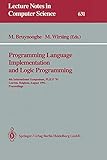Programming Language Implementation and Logic Programming [electronic resource] : 4th International Symposium, PLILP'92 Leuven, Belgium, August 26–28, 1992 Proceedings / edited by Maurice Bruynooghe, Martin Wirsing.
Material type: TextSeries: Lecture Notes in Computer Science ; 631Publisher: Berlin, Heidelberg : Springer Berlin Heidelberg, 1992Description: XI, 494 p. online resourceContent type: text Media type: computer Carrier type: online resourceISBN: 9783540472971Subject(s): Computer science | Software engineering | Logic design | Artificial intelligence | Computer Science | Programming Languages, Compilers, Interpreters | Logics and Meanings of Programs | Mathematical Logic and Formal Languages | Programming Techniques | Artificial Intelligence (incl. Robotics) | Software EngineeringAdditional physical formats: Printed edition:: No titleDDC classification: 005.13 LOC classification: QA76.7-76.73QA76.76.C65Online resources: Click here to access online
TextSeries: Lecture Notes in Computer Science ; 631Publisher: Berlin, Heidelberg : Springer Berlin Heidelberg, 1992Description: XI, 494 p. online resourceContent type: text Media type: computer Carrier type: online resourceISBN: 9783540472971Subject(s): Computer science | Software engineering | Logic design | Artificial intelligence | Computer Science | Programming Languages, Compilers, Interpreters | Logics and Meanings of Programs | Mathematical Logic and Formal Languages | Programming Techniques | Artificial Intelligence (incl. Robotics) | Software EngineeringAdditional physical formats: Printed edition:: No titleDDC classification: 005.13 LOC classification: QA76.7-76.73QA76.76.C65Online resources: Click here to access online  E-BOOKS
E-BOOKS
| Current library | Home library | Call number | Materials specified | URL | Status | Date due | Barcode |
|---|---|---|---|---|---|---|---|
| IMSc Library | IMSc Library | Link to resource | Available | EBK6043 |
Improving control of logic programs by using functional logic languages -- Independent AND-parallel implementation of narrowing -- Binding techniques and garbage collection for OR-parallel CLP systems -- Path analysis for lazy data structures -- Why the occur-check is not a problem -- Incremental evaluation of natural semantics specifications -- Subsumption-oriented Push-Down Automata -- Unlimp uniqueness as a leitmotiv for implementation -- Using cached functions and constructors for incremental attribute evaluation -- Strictness analysis for attribute grammars -- Checking and debugging of two-level grammars -- On safe folding -- Unfold/fold transformations preserving termination properties -- A technique for transforming logic programs by fold-unfold transformations -- FOLON: An environment for declarative construction of logic programs -- A complete indexing scheme for WAM-based abstract machines -- Fast prolog with a VAM1p based Prolog compiler -- Metastructures vs. attributed variables in the context of extensible unification -- Comparing the Galois connection and widening/narrowing approaches to abstract interpretation -- Derivation of linear size relations by abstract interpretation -- Generic abstract interpretation algorithms for prolog: Two optimization techniques and their experimental evaluation -- A bottom-up interpreter for a higher-order logic programming language -- Camel: An extension of the categorical abstract machine to compile functional/logic programs -- On the interaction of lazy evaluation and backtracking -- Interprocedural dynamic slicing -- Algorithmic debugging for lazy functional languages -- A general trace query mechanism based on Prolog -- Fully declarative logic programming -- Our LIPS are sealed: Interfacing functional and logic programming systems -- Analyses of inconsistency for incremental equational logic programming -- I/O trees and interactive lazy functional programming -- UCG-E: An equational logic programming system -- A relational programming system with inferred representations -- An implementation of action semantics (Summary) -- BinProlog: A continuation passing style Prolog engine -- LaToKi: A language toolkit for bottom-Up evaluation of functional programs -- Implementing higher-order functions in an algebraic specification language with narrowing -- Implementing attribute grammars by computational models -- ProQuery: Logical access to an OODB -- Inference of inheritance relationships from Prolog programs: a system developed with PrologIII -- CLP(PB).
This volume contains the papers accepted for presentation at the Fourth International Symposium on Programming Language Implementation and Logic Programming (PLILP '92) held in Leuven, Belgium, August 26-28, 1992. Theaim of the symposium was to explore new declarative concepts, methods and techniques relevant for implementation of all kinds of programming languages, whether algorithmic or declarative. The symposium gathered researchers from the fields of algorithmic programming languages as well as logic, functional, and object-oriented programming. The topics discussed in the volume include: - Declarative implementation techniques; - Implementation of declarative concepts and modules; - Compiler specification and construction; - Program transformation; - Programming environments for declarative languages; - Amalgamation of logic programming with algorithmic, functional, or object-oriented techniques; - Executable specification.


There are no comments on this title.